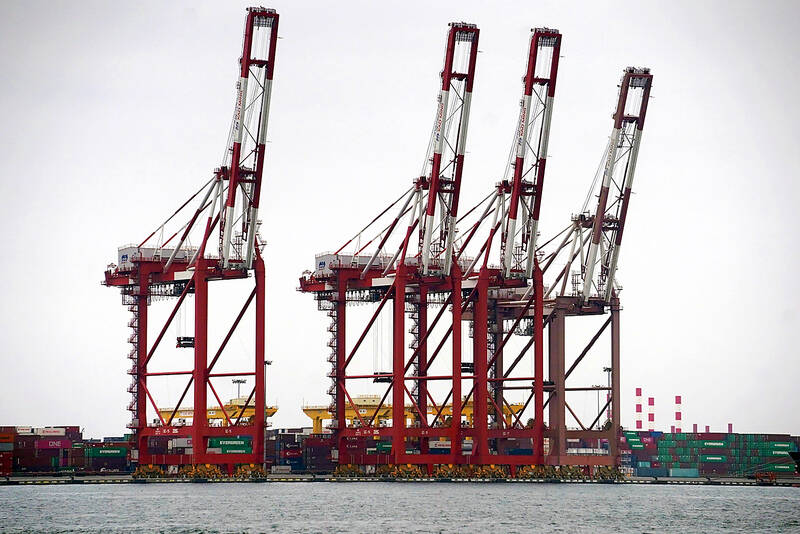Taiwan’s industrial production last month rose 19.97 percent from the same month last year due to strong demand for electronic components used in artificial intelligence (AI) and high-performance computing, the Ministry of Economic Affairs said yesterday.
The index printed 108.55 last month, up for the 10th straight month and an increase of 6.14 percent from a month earlier, the ministry said in a report.
The economic measure last year expanded 11.45 percent, emerging from two years of downturn in spite of an imbalanced recovery, it said.

Photo: CNA
The manufacturing industry outperformed other sectors, such as suppliers of electricity, water and chemical products, with an uptick of 20.79 percent, Department of Statistics Deputy Director-General Huang Wei-jie (黃偉傑) said.
The growth would continue this month at a moderate pace of 3.9 percent, Huang said, citing a survey of firms, as most of them would halt operations over the Lunar New Year holiday.
Last month, chip suppliers’ output swelled 37.51 percent from a year earlier, while output at vendors of computers, electronics and optical devices soared 58.78 percent, Huang said, attributing the gains to spending by US technology giants to build AI capabilities.
By contrast, base metal and vehicle parts suppliers reported a retreat of 4.24 percent and 9.05 percent respectively as the market needed more time to digest a supply glut, Huang said.
For the final quarter of last year, local chipmakers achieved a 26.77 percent increase in industrial output, as Taiwan is home to suppliers of advanced chips used in latest-generation smartphones and cloud-based data centers, as well as chip packaging.
Chip production last year spiked 25.12 percent compared with 2023, higher than the average 19.52 percent gain for electronic components, the ministry said.
Local manufacturers of chemical and metal products failed to stage a comeback for the third consecutive year, while auto parts makers slipped into contraction, ending three years of growth, Huang said.
“China’s overproduction accounted for the decline in global orders and selling prices,” he said.
The US-China trade dispute and geopolitical tensions are adding uncertainty, although AI development would continue, which is favorable to local tech firms, the ministry said.
Industrial output for this month would slow compared with last month, when customers built up inventory ahead of the Lunar New Year holiday, it said.
Only 6 percent of firms expected production to pick up, while 29.3 percent projected a decrease, it said, adding that 64.1 percent expected business to remain the same.

SEEKING CLARITY: Washington should not adopt measures that create uncertainties for ‘existing semiconductor investments,’ TSMC said referring to its US$165 billion in the US Taiwan Semiconductor Manufacturing Co (TSMC, 台積電) told the US that any future tariffs on Taiwanese semiconductors could reduce demand for chips and derail its pledge to increase its investment in Arizona. “New import restrictions could jeopardize current US leadership in the competitive technology industry and create uncertainties for many committed semiconductor capital projects in the US, including TSMC Arizona’s significant investment plan in Phoenix,” the chipmaker wrote in a letter to the US Department of Commerce. TSMC issued the warning in response to a solicitation for comments by the department on a possible tariff on semiconductor imports by US President Donald Trump’s

The government has launched a three-pronged strategy to attract local and international talent, aiming to position Taiwan as a new global hub following Nvidia Corp’s announcement that it has chosen Taipei as the site of its Taiwan headquarters. Nvidia cofounder and CEO Jensen Huang (黃仁勳) on Monday last week announced during his keynote speech at the Computex trade show in Taipei that the Nvidia Constellation, the company’s planned Taiwan headquarters, would be located in the Beitou-Shilin Technology Park (北投士林科技園區) in Taipei. Huang’s decision to establish a base in Taiwan is “primarily due to Taiwan’s talent pool and its strength in the semiconductor

An earnings report from semiconductor giant and artificial intelligence (AI) bellwether Nvidia Corp takes center stage for Wall Street this week, as stocks hit a speed bump of worries over US federal deficits driving up Treasury yields. US equities pulled back last week after a torrid rally, as investors turned their attention to tax and spending legislation poised to swell the US government’s US$36 trillion in debt. Long-dated US Treasury yields rose amid the fiscal worries, with the 30-year yield topping 5 percent and hitting its highest level since late 2023. Stocks were dealt another blow on Friday when US President Donald

UNCERTAINTY: Investors remain worried that trade negotiations with Washington could go poorly, given Trump’s inconsistency on tariffs in his second term, experts said The consumer confidence index this month fell for a ninth consecutive month to its lowest level in 13 months, as global trade uncertainties and tariff risks cloud Taiwan’s economic outlook, a survey released yesterday by National Central University found. The biggest decline came from the timing for stock investments, which plunged 11.82 points to 26.82, underscoring bleak investor confidence, it said. “Although the TAIEX reclaimed the 21,000-point mark after the US and China agreed to bury the hatchet for 90 days, investors remain worried that the situation would turn sour later,” said Dachrahn Wu (吳大任), director of the university’s Research Center for